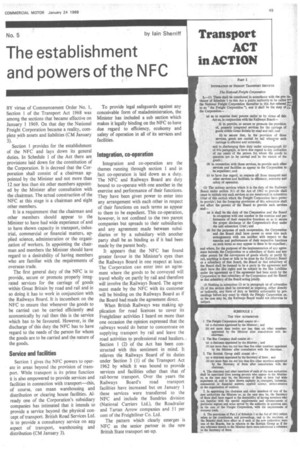The establishment and powers of the NFC
Page 51

If you've noticed an error in this article please click here to report it so we can fix it.
BY virtue of Commencement Order No. 1, Section 1 of the Transport Act 1968 was among the sections that became effective on January 1 1969. On that day the National Freight Corporation became a reality, complete with assets and liabilities (CM January 3).
Section 1 provides for the establishment of the NFC and lays down its general duties. In Schedule 1 of the Act there are provisions laid down for the constitution of the Corporation. It is decreed that the Corporation shall consist of a chairman appointed by the Minister and not more than 12 nor less than six other members appointed by the Minister after consultation with the chairman. The actual construction of the NFC at this stage is a chairman and eight other members.
It is a requirement that the chairman and other members should appear to the Minister to have had wide experience of and to have shown capacity in transport, industrial, commercial or financial matters, applied science, administration or the organization of workers. In appointing the chairman and members the Minister should have regard to a desirability of having members who are familiar with the requirements of overseas trade.
The first general duty of the NFC is to provide, secure or promote properly integrated services for the carriage of goods within Great Britain by road and rail and in so doing it has to work in conjunction with the Railways Board. It is incumbent on the NFC to ensure that whenever the goods to be carried can be carried efficiently and economically by rail then this is the service which has to be favoured. However, in the discharge of this duty the NFC has to have regard to the needs of the person for whom the goods are to be carried and the nature of the goods.
Service and facilities
Section 1 gives the NFC powers to operate in areas beyond the provision of transport. While transport is its prime function it is also empowered to provide services and facilities in connection with transport—this, of course, can mean warehousing and distribution or clearing house facilities. Already one of the Corporation's subsidiary companies has intimated that it intends to provide a service beyond the physical concept of transport. British Road Services Ltd. is to provide a consultancy service on any aspect of transport, warehousing and distribution (CM January 3). To provide legal safeguards against any conceivable form of maladministration, the Minister has included a sub section which makes it legally binding on the NFC to have due regard to efficiency, economy and safety of operation in all of its services and facilities.
Integration, co-operation
Integration and co-operation are the themes running through section 1 and in fact co-operation is laid down as a duty. The NFC and Railways Board are duty bound to co-operate with one another in the exercise and performance of their functions. They have been given power to enter into any arrangement with each other in respect of their functions on such terms as appear to them to be expedient. This co-operation, however, is not confined to the two parent companies but spreads to their subsidiaries and any agreement made between subsidiaries or by a subsidiary with another party shall be as binding as if it had been made by the parent body.
It appears that the NFC has found greater favour in the Minister's eyes than the Railways Board in one respect at least. The Corporation can enter into an agreement where the goods to be conveyed will travel wholly on partly by rail and therefore will involve the Railways Board. The agreement made by the NFC with its customer will be binding on the Railways Board as if the Board had made the agreement direct.
When British Railways was making application for road licences to cover its Freightliner activities I heard on more than one occasion the opinion expressed that the railways would do better to concentrate on supplying transport by rail and leave the road activities to professional road hauliers.. Section 1 (2) of the Act has been constructed with this sentiment in mind. It relieves the Railways Board of its duties under Section 3 (1) of the Transport Act 1962 by which it was bound to provide services and facilities other than that of rail-borne transport. Over the years the Railways Board's road transport facilities have increased but on January 1 these services were transferred to the NFC and include the Sundries division (National Carriers Ltd.), the Roadrailer and Tartan Arrow companies and 51 per cent of the Freightliner Co. Ltd.
The pattern which clearly emerges is NFC as the senior partner in the new British State transport set-up.








































































































